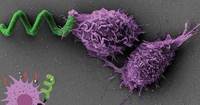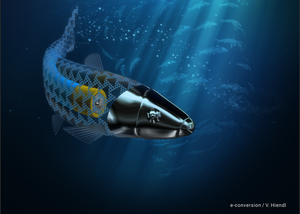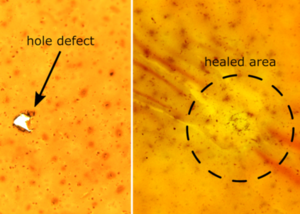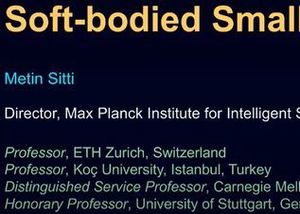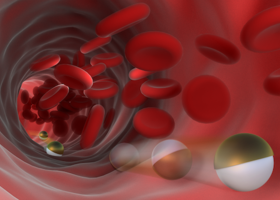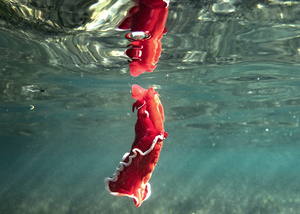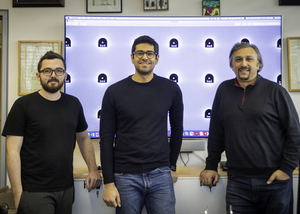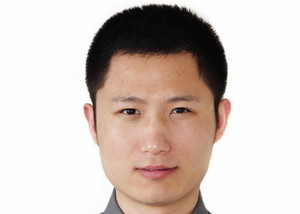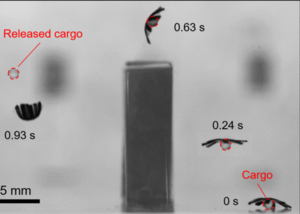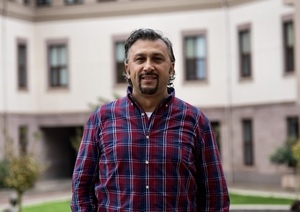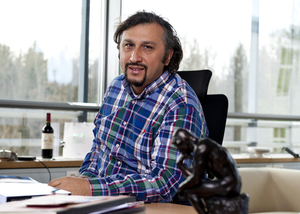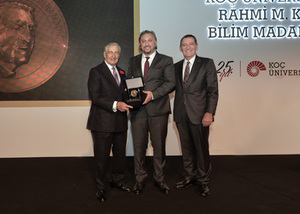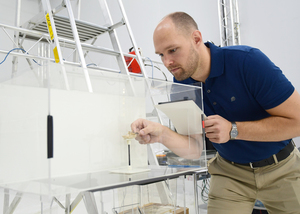News
Physical Intelligence
News
19-11-2020
The “top ten Ph.D. graduates of Harbin Institute of technology” award
Congratulations to our alumni Xinjian Fan, who was just awarded as one of the top ten Ph.D. graduates in Harbin Institute of Technology, China.
Fan Xinjian
Xiaoguang Dong
Alp Can Karacakol
Metin Sitti
Physical Intelligence
News
11-11-2020
Bioinspired cilia help understand which movement pattern generates maximal fluid flows
Scientists at the Max Planck Institute for Intelligent Systems in Stuttgart, Germany, develop artificial cilia that can be programmed to move in waves. In experiments, the researchers show how the millimeter-small cilia can pump viscous liquids just as effectively as their natural counterparts. Their research helps shed light on the mystery regarding which movement pattern generates a maximal fluid flow. Published in Science Advances, their findings contribute to a better understanding of the biomechanics of real cilia, and to the development of miniature robotic pumping devices that could one day be used inside the human body.
Xiaoguang Dong
Wenqi Hu
Ziyu Ren
Metin Sitti
Physical Intelligence
News
09-11-2020
Metin Sitti receives the «Breakthrough of the Year» Award at the Fallings Walls World Science Summit in Berlin
A Director at the Max Planck Institute for Intelligent Systems in Stuttgart, Sitti is one of the world’s leading scientists in the field of physical intelligence. He is a pioneer in several areas of research, among them wireless tiny medical robots, gecko-inspired adhesives, and bio-inspired miniature robots.
Metin Sitti
Physical Intelligence
News
26-10-2020
Stealth microrobots fly under the radar of the immune system
Our immune system generally protects us from pathogens but sometimes it can work against us by eliminating drugs or other therapeutics circulating in our bloodstream
Pol Cabanach Xifro
Abdon Pena-Francesch
Devin Sheehan
Ugur Bozuyuk
Oncay Yasa
Metin Sitti
Physical Intelligence
News
15-10-2020
Meng Li receives Humboldt Postdoctoral Research Fellowship
The scientist working in the Physical Intelligence Department at the Max Planck Institute for Intelligent Systems in Stuttgart will be supported by the Alexander von Humboldt Foundation for two years to continue her soft robotic research in Germany.
Meng Li
Metin Sitti
Physical Intelligence
Appointment
01-10-2020
Wendong Wang becomes Assistant Professor at UM-SJTU Joint Institute
Physical Intelligence
News
24-09-2020
Solar-battery effect enables a new light-driven organic microswimmer to operate in the dark
An interdisciplinary team of scientists at the Max Planck Institutes for Intelligent Systems and Solid State Research has developed a biocompatible microswimmer made of carbon nitride, which they can propel forward through light. The particle can also store solar energy similar to miniature solar cells equipped with batteries, and can thus also swim in the dark using the stored energy. Even if the illumination is turned off, it can move forward for about half an hour with just 30 seconds of prior illumination. The photo-charging ability of this newly developed microswimmer opens up many opportunities for targeted drug delivery, environmental remediation, and other potential applications for such photo-chargeable micro- and nanomachines.
Varun Sridhar
Metin Sitti
Filip Podjaski
Bettina Lotsch
Physical Intelligence
Appointment
01-08-2020
Hamed Shahsavan becomes Assistant Professor at the University of Waterloo
Physical Intelligence
News
27-07-2020
Self-healing soft material outsmarts nature
A soft material that heals itself instantaneously is now reality. A team of scientists at the Max Planck Institute for Intelligent Systems and at Pennsylvania State University tune the nanostructure of a new stretchable material in such a way that it now entirely recovers its structure and properties at the blink of an eye after being cut or poked. The squid-inspired material could revolutionize the research field of soft robotics. Since it can reverse any undergone damage, it makes many real-world applications possible in which robots have to deal with dynamic and unpredictable environments.
Abdon Pena-Francesch
Metin Sitti
Physical Intelligence
News
24-07-2020
Hakan Ceylan wins the 2020 Günter Petzow Prize
The senior research scientist in the Physical Intelligence Department received the award during the virtual 2020 Intelligent Systems Summer Colloquium
Hakan Ceylan
Katherine J. Kuchenbecker
Metin Sitti
Physical Intelligence
News
02-07-2020
Video: Microrobots roll against blood flow to deliver drugs
With the help of magnetic fields, the bots might one day navigate the circulatory system to target tumors
Drug-carrying microrobots offer a way to deliver treatments straight to where they are needed, such as tumors deep within the body. But most bots designed in labs have so far been limited to easy-to-reach targets such as the gut. Now, researchers have developed drug-delivering “microrollers” that can move against blood flow (Sci. Robot. 2020, DOI: 10.1126/scirobotics.aba5726). With the help of a magnetic field, these two-faced particles might one day navigate our circulatory system to deliver treatments to tumors. The microrollers are coated on one side with magnetic materials and on the other with antibodies specific to cancer cells. These antibodies would help the particles selectively bind to tumors in the body, where they could release their payload. This targeted approach could minimize exposure of healthy cells to cancer drugs, reducing side effects.
Metin Sitti
Yunus Alapan
Ugur Bozuyuk
Physical Intelligence
News
20-05-2020
EML Webinar by Prof. Metin Sitti, Max Planck Institute for Intelligent Systems
Our Director Metin Sitti hosted an Extreme Mechanical Letters (EML) Webinar with the topic "Soft-bodied Small-Scale Robots". The EML Webinars are a series of very prestigious lectures with many great speakers.
Metin Sitti
Physical Intelligence
News
20-05-2020
Rolling into the deep
Scientists took a leukocyte as the blueprint and developed a microrobot that has the size, shape and moving capabilities of a white blood cell. They covered the ball-shaped microroller with a magnetic nanofilm on one side and with anti-cancer drugs on the other. Simulating a blood vessel in a laboratory setting, they succeeded in magnetically navigating the microroller through this dynamic and dense environment. The drug-delivery vehicle withstood the simulated blood flow, pushing the developments in targeted drug delivery a step further: inside the body, there is no better access route to all tissues and organs than the circulatory system. A robot that could actually travel through this finely woven web would revolutionize the minimally-invasive treatment of illnesses.
Yunus Alapan
Ugur Bozuyuk
Pelin Erkoc
Alp Can Karacakol
Metin Sitti
Physical Intelligence
News
14-05-2020
Reprogramming of macroscopic self-assembly with dynamic boundaries
Scientists at the Max Planck Institute for Intelligent Systems in Stuttgart aim to understand the underlying process of self-assembly. Their findings not only provide valuable insights into fundamental physics, but could enable the design of functional materials or self-assembled miniature robots.
Utku Culha
Zoey Davidson
Massimo Mastrangeli
Metin Sitti
Physical Intelligence
News
28-04-2020
Scientists outsmart nature by building super liquid-repellent dry adhesives
A specific fibril tip shape design is the key to achieving elastic dry fibril adhesives with super liquid repellency. This new bioinspired material opens up many possibilities for use, as it prevents any form of liquid droplet or layer from hindering or degrading its adhesion.
Ville Liimatainen
Dirk Drotlef
Donghoon Son
Metin Sitti
Physical Intelligence
News
26-02-2020
Underwater Snail-o-Bot gets kick from light
Light-fueled liquid crystal gels used to create robot inspired by aquatic invertebrates
Researchers at the Max Planck Institute for Intelligent Systems in Stuttgart in cooperation with Tampere University in Finland developed a gel-like robot inspired by sea slugs and snails they are able to steer with light. Much like the soft body of these aquatic invertebrates, the bioinspired robot is able to deform easily inside water when exposed to this energy source. Due to specifically aligned molecules of liquid crystal gels – its building material – and illumination of specific parts of the robot, it is able to crawl, walk, jump, and swim inside water. The scientists see their research project as an inspiration for other roboticists who struggle to design untethered soft robots that are able to move freely in a fluidic environment. Such inventions could one day play a pivotal role in the research field of minimally-invasive robotic medical applications.
Hamed Shahsavan
Amirreza Aghakhani
Metin Sitti
Yubing Guo
Physical Intelligence
News
03-02-2020
Acoustically driven microrobot outshines natural microswimmers
Researchers at the Max Planck Institute for Intelligent Systems in Stuttgart have designed and fabricated an untethered microrobot that can slip along either a flat or curved surface in a liquid when exposed to ultrasound waves. Its propulsion force is two to three orders of magnitude stronger than the propulsion force of natural microorganisms such as bacteria or algae. Additionally, it can transport cargo while swimming. The acoustically propelled robot hence has significant potential to revolutionize the future minimally invasive treatment of patients.
Metin Sitti
Amirreza Aghakhani
Oncay Yasa
Physical Intelligence
Award
01-01-2020
Hamed Shahsavan, Amirreza Aghakhani, Yubing Guo, Zoey Davidson, and Metin Sitti were the Cozzarelli Prize Finalist in the Engineering and Applied Sciences category in the PNAS journal for the research article entitled, “Bioinspired underwater locomotion of light-driven liquid crystal gels” (1 paper won the prize and our paper was the finalist out of over 4000 papers published in PNAS in 2020).
Physical Intelligence
News
22-07-2019
Jiachen Zhang receives Humboldt Postdoctoral Research Fellowship
The scientist working in the Physical Intelligence Department at the Max Planck Institute for Intelligent Systems in Stuttgart will be supported by the Alexander von Humboldt Foundation for two years to continue his soft robotic research in Germany.
Jiachen Zhang
Physical Intelligence
News
02-07-2019
Jellyfish-inspired robot wins Best Paper Award in prestigious Robotics Science & Systems Conference
The scientists at the Max Planck Institute for Intelligent Systems in Stuttgart who invented Jellyfishbot win the Best Paper Award at a prestigious robotics conference and have their work published in Nature Communications. Their research holds great potential when investigating the impact of environmental changes in the ocean’s ecosystem. Another aim is for Jellyfishbot to be applied in the treatment of cancer.
Metin Sitti
Xiaoguang Dong
Wenqi Hu
Ziyu Ren
Tianlu Wang
Valerie Callaghan
Physical Intelligence
News
25-06-2019
Novel approach to self-assembling mobile micromachines
How the components come together depends on their design and shape and the resulting dielectrophoretic forces when exposed to an electric field.
Metin Sitti
Yunus Alapan
Mehmet Berk Yigit
Physical Intelligence
News
28-03-2019
Leading researcher in small-scale robotics receives ERC Advanced Grant
One of the world's most prestigious research funding programs supports Intelligent Systems research in Stuttgart
The European Research Council is awarding a 2.5 million Euros research grant to Dr. Metin Sitti, who is a Director at the Max Planck Institute for Intelligent Systems. Sitti is the head of the Physical Intelligence Department and one of the world's leading researchers in the field of small-scale and soft robotics and its use in medical applications. The funding will go toward ground-breaking basic research in soft-bodied miniature mobile robots. These tiny machines could one day have a radical impact on non-invasive medical interventions and diagnostics.
Metin Sitti
Richard Segar
Physical Intelligence
News
22-03-2019
Metin Sitti publishes a News & Views article in Nature
Robotic collectives inspired by biological cells
A robotic system has been demonstrated in which the random motion of individual components leads to deterministic behaviour, much as occurs in living systems. Environmental and medical applications could follow.
Metin Sitti
Physical Intelligence
News
22-11-2018
Metin Sitti receives Rahmi Koç Medal of Science
Award recognizes most promising researchers of Turkish origin
Metin Sitti
Physical Intelligence
News
27-08-2018
A slippery world in bio-inspired robotics
A roboticist at the Max Planck Institute for Intelligent Systems studies the multifunctional feet of the desert locust and its jumping behavior on different surfaces to extract the traits which contribute to enhancing surface friction and stop slips. The scientist then built a robot inspired by the locust. His findings about the morphological intelligence of the insect contribute to solving the complex locomotion problems seen in even the most advanced robots. This new field of research is increasingly gaining attention within the scientific community, so much so that renowned science journal Proceedings of the National Academy of Sciences published the researcher´s findings in its latest edition.
Matthew Woodward
Metin Sitti



